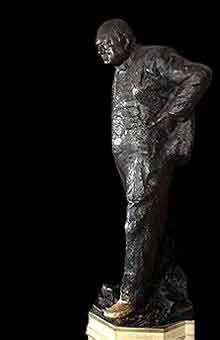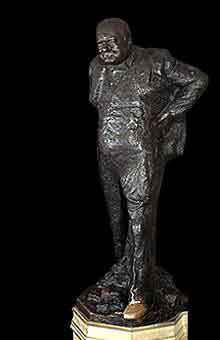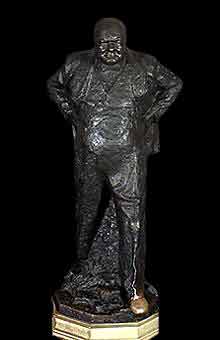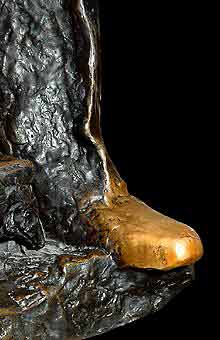Sir Winston Leonard Spencer Churchill (1874-1965)
Coalition Prime Minister 1940-1945
© 2007
Armchair Travel Co. Ltd. - This page may be used for non-commercial purposes
ONLY!
![]()

[ Play
Narrated and Animated Movie ! ] This statue of Sir Winston Churchill is by Oscar Nemon, and was unveiled in 1969. It is one of a series of studies produced around this time by the sculptor, who was a great admirer of Churchill. He had at one time proposed a giant portrait head of the great man 40 by 35 feet in size, to be placed on the South Bank of the Thames opposite the Palace of Westminster. It was never carried out. The foot of this statue which is nearer the entrance to the Chamber is rubbed smooth by the hands of the many Parliamentarians who have sought thus to acquire something of the greatness of the man who was probably the greatest British statesman of this century, and incomparable leader in War.
When Mr Attlee is presiding in the absence of the Prime Minister the Cabinet meets on time, goes systematically through its agenda, makes the necessary decisions, and goes home after three or four hours' work. When Mr Churchill presides we never reach the agenda and we decide nothing. But we go home to bed at midnight, conscious of having been present at an historic occasion.
Winston Spencer Churchill was the eldest son of Lord Randolph Churchill and Jennie Jerome, born in Blenheim Palace, 1874. After having graduated from military college Churchill went to serve in India and the Sudan, where he distinguished himself by single handedly killing nine natives with his revolver. In 1899 he tried to enter the British political service, but on failing to get elected he went to South Africa as the chief war correspondent for the Morning Post during the Boer War. Returning to England in 1900, he entered Parliament as the Conservative member for Oldham. By 1904 Churchill had switched to the Liberal Party - he was a free-thinker willing to work with any party who supported his principles. Churchill rapidly became Chairman of the Board of Trade, then Home Secretary, then, in 1911, First Lord of the Admiralty. He spent the next three years reforming the Navy.
When the war began Churchill's work was widely recognised, and hence his national popularity was at a high point. However his failure with the Dardanelles Campaign in 1915 led rapidly to his downfall, and at Conservative insistence he was removed from the Coalition government - who had never forgiven his defection to the Liberal Party. After fighting with the British forces in Flanders he was recalled by Lloyd George who gave him a succession of cabinet posts. He campaigned unsuccessfully for support against the Bolshevik Revolution in Russia, and, with the fall of Lloyd George's government in 1922, he lost both his office and his seat.
Returning to the Conservatives in 1924, Churchill became Baldwin's Chancellor of the Exchequer without much success. By 1929 he was out in the cold again for opposing the granting of dominion status to India, and later on through his support of Edward VIII during the abdication crisis. Churchill opposed British appeasement to the dictators of Europe, and believing that peace was not secure, he called for rearmament - but he was virtually ignored until it was too late. The next ten years were spent in a 'political wilderness' where he spent his time writing and reflecting, all his warnings being dismissed. However, on the declaration of war in 1939 following Hitler's invasion of Poland, Churchill was called back to the Admiralty. In 1940 he was made Prime Minister, the obvious choice for a leader in this time of war. He headed a Coalition government, with a small War Cabinet in which he was also First Lord of the Treasury and Minister of Defence. Churchill was a brilliant orator and inspiring leader and many of his wartime speeches have gone down in history, for example his comment after the Battle of Britain that "never in the field of human conflict was so much owed by so many to so few". His close working relationship with Roosevelt and Stalin helped ensure the success of the Allied strategy. Their conference at Yalta in 1945 agreed on the division and occupation of Germany and the establishment of the United Nations.
Allied victory had brought Churchill tremendous stature and popularity, but by then he was out of touch with the mood of social reform in Britain. In 1945 the Conservatives were defeated and Churchill was deeply offended by his country's rejection of him. He did not return to power until 1951 when, at the age of seventy six, he was made Prime Minister once again (he was knighted in 1953). Churchill continued to concern himself principally with foreign affairs, but found the new deferential relationship with the US, now led by the former Allied commander Dwight Eisenhower, a difficult one. In 1955, at the age of eighty one, he was finally persuaded to retire, handing on the leadership to Anthony Eden, his long-time colleague.
Churchill died in 1965. On the announcement of his death the country paid its respects by lowering all flags to half mast, tolling the bell of St. Paul's Cathedral and extinguishing all London street lights. He was given a state funeral, and his body lay in state in Westminster Hall for three days, where thousands of people paid their last respects to a man who will always be regarded as one of our greatest statesmen.
Churchill had a phenomenal memory, if he read a document four times, he would memorise it word for word and used this to great effect in the House of Commons where it is not permitted to read a speech. Churchill was also a very able historian, writing histories of the Second World War, of his ancestor the first Duke of Marlborough, and his well-known 'History of the English-speaking Peoples'. He was also a recipient of the Nobel Prize for literature.
We mean to hold our own. I have not become the King's First Minister in order to preside over the liquidation of the British Empire.
Always remember that I have taken more out of alcohol than alcohol has taken out of me.
I would say to the House, as I said to those who have joined the Government: 'I have nothing to offer but blood, toil, tears and sweat'.
I cannot forecast to you the action of Russia. It is a riddle wrapped in a mystery inside an enigma.
He has spoilt himself by reading about Napoleon.
He is a young man who will go far if he doesn't over-balance!
Churchill at the top of the wave has in him the stuff of which tyrants are made.
... In private conversation he tries on speeches like a man trying on ties in his bedroom to see how he would look in them.
The first time you meet Winston you see all his faults and the rest of your life you spend in discovering his virtues.
[ Virtual
Tour ] [ Main Topics
Index ]
- Ellen Wilkinson, during the Second World War, in Kingsley Martin, Harold Laski.




Additional Information on
Sir Winston Leonard Spencer Churchill (1874-1965)
Coalition Prime Minister 1940-1945
QUOTATIONS
- Himself, Mansion House Speech, 10 Nov 1942.
- Himself, Quoted by Quentin Reynolds.
- Himself, Speech in Commons 13 May 1940.
- Himself, Radio broadcast, 1 Oct 1939.
- Lloyd George to Frances Stevenson, 1917; quoted In her diary
- Himself, Cecil John Rhodes, 1901, in Rhodes: A Life.
- Lord Beaverbrook, Politicians and the War.
- Lionel Curtis, Letter to Nancy Astor, 1912.
- Lady Lytton, in Christopher Hassall, Edward Marsh.
Explore-Parliament.net: Advanced Category Search
Keyword Categories:
_Object_Sculpture
_Object_Artwork
_Object_Portrait
_Artist_Nemon
_Consort
_Man
_Person
_Politician
_Churchill